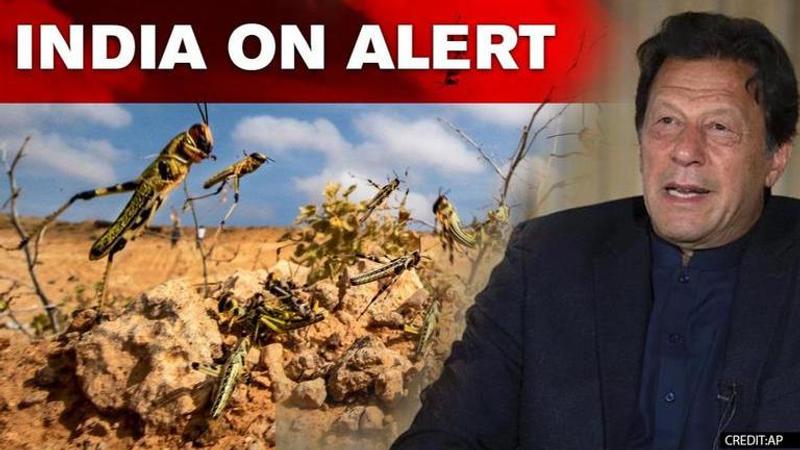Published 09:53 IST, May 22nd 2020
Annual Locust swarm from Pakistan & Iran arriving early; Imran Khan's govt incommunicado
India is on high alert to tackle the menace of early-than-usual summer invasion of the desert locusts. The country's agriculture activity is at severe risk

India is on high alert to tackle the menace of earlier-than-usual summer invasion of the desert locusts. The country's agriculture activity is at severe risk as a large swarm of locusts is making its way to Indian states such as Rajasthan after breeding and maturing in Iranian provinces and Pakistan’s Balochistan province.
The locust alert came on Wednesday after a month of monitoring by the locust warning office, a wing under the agriculture ministry’s directorate of plant protection. Their field agents spotted clouds of the insects in mid-April in Rajasthan’s Sri Ganganagar and Jaisalmer districts.
The Ministry of Agriculture and Farmers Welfare has begun initiatives to promote regional cooperation to control the locust. There is consensus that the Desert Locust could pose a grave challenge in 2020. The ministry has already started efforts in the matter by deploying drones, satellite-derived tools, special fire-tenders and sprayers at pre-identified border locations. It is also considering to import equipment from the UK to control the locust, reported sources.
Indian Govt proposes joint effort to Iran and Pakistan to tackle locust
The Indian government has proposed a coordinated response to Iran and Pakistan for the desert locust control which is expected to move from spring breeding of Balochistan to summer breeding along India-Pakistan border. India has suggested providing pesticide Malathion to Pakistan to control the operation along the border, sources have reported. While Iran has positively responded to the offer, the Indian government is still awaiting a response from the Imran Khan-led administration.
Protocols are also in place for India to hold videoconferencing meetings with authorities in Pakistan for joint strategies as per sources.
According to the Food and Agriculture Organization of the United Nations (FAO) reports, in Iran, hopper bands of the Locust are maturing along the southwestern coastal plains, and another generation of breeding is underway in the southeast where hatching is taking place on the coast and in the interior of Sistan-Baluchistan. While in Pakistan, adult groups are migrating to the India border from breeding areas in Baluchistan where hopper groups are present as well as in Pakistan's Punjab and Pakistan occupied Kashmir's Khyber Pakhtunkhwa.
Meanwhile, in India, more adult groups and small swarms have arrived from Pakistan in the past weeks and moved east into Rajasthan, reaching Jodhpur.
Six border meetings between the Locust officers led by Plant Protection Advisers of India and Pakistan are held every year between June to November either at Munabao (India side) and or at Khokhropar (Pakistan side) for exchanging information on locust situation of both the countries, they said.
Further, the regional cooperation on locust control is driven by FAO. India participates in the meetings and sessions of the FAO's Desert Locust Control Committee, participates and organizes the meetings of FAO's Commission for Controlling Desert Locust in South West Asia; and participates in the Joint Survey Programmes with Pakistan and Iran organised by the FAO.
The desert locust is a species of locust, a swarming short-horned grasshopper. They are known to devour everything in their path, posing an unprecedented threat to the food supply and livelihoods of millions of people.
(With ANI inputs)
Updated 09:53 IST, May 22nd 2020




